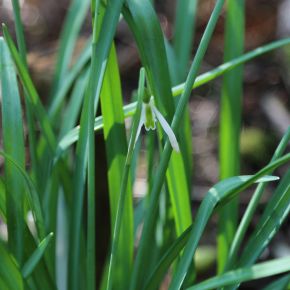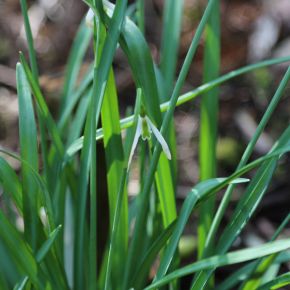Galanthus 'Wasp'
(Snowdrop 'Wasp')
Family - Amaryllidaceae
Category - Bulb
Origin - Discovered in England
Discovered By - Veronica Cross, gardener and plantsman
Year of Introduction - 1995
Season of Interest - Winter
Hardiness - H5
Height - 15cm
Width - 8cm
Location - The Woodland Walk
Description: A low-growing, bulbous Perennial with a clump-forming habit. Fleshy grey-green to mid-green Basal Leaves are lanceolate to strap-shaped and upright. Delicate snow-white flowers are bell-shaped and pendent. The Blooms have three shorter, notched inner petals, each marked with a green horseshoe-shape at the tip and heavy green shading to the base. Three longer, narrow outer petals are oblong in shape and are pointed at the tips. The overall shape of the flower is reminiscent of a wasp. The Blooms are held singly on upright stems and are produced in late winter. The flowers have a sweet scent which is best appreciated when brought indoors.
Flower:
Fragrant white flowers are bell-shaped and pendent. The blooms have three shorter, notched inner tepals (petals) each marked with a green horseshoe-shape at the tip and heavy green shading to the base. Three longer, narrow outer tepals are oblong in shape and pointed at the tips. The flowers are held singly on upright stems and are produced in February. This cultivar has green ovaries.
Flower colour: White, green
Flower shape: Bell-shaped flowers held singly
Flowering time: February
Foliage:
Grey-green mid-green leaves are strap-shaped to lanceolate. Each bulb produces two (occasionally three) upright, Basal Leaves.
Foliage Senescence: Deciduous
Foliage Shape: Strap-shaped to lanceolate
Poison Information:
This plant may cause discomfort if ingested.
Propagation:
Division.
Cultivation:
Best in full sun to partial shade in fertile, moisture-retentive soil that is well-drained. Protect from drought during the summer months.

